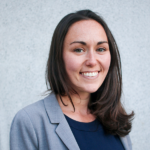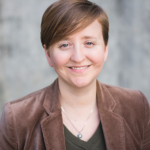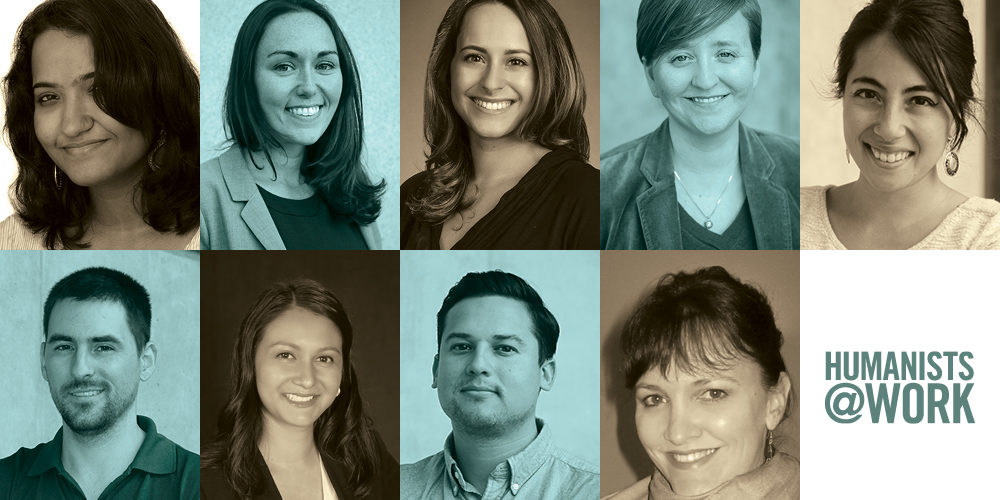Every year, Humanists@Work welcomes a new Graduate Advisory Committee to offer substantive feedback on all activities, plan and lead workshops, and contribute to the HumWork website. While we are excited to work with our new committee, this also means that we are saying goodbye—at least in this capacity—to last year’s committee. To start off the new year, we asked both groups some questions about their experiences with HumWork and how they viewed the past and future of the HumWork community. Here are their responses.
For the 2016-17 HumWork Advisory Committee:
In the past year, one of the clear foci of HumWork has been an emphasis on community. At our HumWork Santa Barbara workshop we focused on this in two ways: through partnering with Cindy Au to talk about how to develop and support communities, and through a UC-wide survey that found, among many results, the importance of community for graduate students to feel and be supported by peers and colleagues.
As you transition out of the HumWork advisory committee, we are curious to know how you’re thinking about the space, activities, and community of Humanists@Work as something that is potentially transportable. What about what we’ve been doing can be shared with others or utilized in parts or pieces? What have you learned or discovered about either the role of community, and how institutions and/or individuals can participate in its development and sustenance?
Sowparnika Balaswaminathan
 The main thing I learned about community over the past year of being a HumWork Advisory Committee member is that it takes WORK. While organizing events and groups that can create and sustain the sense of community is assumed to involve a lot of work time, we rarely think of participating in a community itself as being labor, but that’s what a lot of my conversations with participants and organizers have revealed. As graduate students, we already do so much work and multitasking. Irrespective of whether we categorize being involved in a community as labor, we understand it as so and I believe that this is why it can be difficult to sustain student interest in extra-curricular (even if career-oriented) organizations and events. The labor we might have to put in to become part of a community needs to be compensated in a fair manner, and often it doesn’t seem like there is any compensation.
The main thing I learned about community over the past year of being a HumWork Advisory Committee member is that it takes WORK. While organizing events and groups that can create and sustain the sense of community is assumed to involve a lot of work time, we rarely think of participating in a community itself as being labor, but that’s what a lot of my conversations with participants and organizers have revealed. As graduate students, we already do so much work and multitasking. Irrespective of whether we categorize being involved in a community as labor, we understand it as so and I believe that this is why it can be difficult to sustain student interest in extra-curricular (even if career-oriented) organizations and events. The labor we might have to put in to become part of a community needs to be compensated in a fair manner, and often it doesn’t seem like there is any compensation.
This is where HumWork has shown us a path to productive success. HumWork works as a community even though it also involves labor from the participants because the experience and the deliverables are ample rewards. Labor deserves to be compensated and HumWork does that by providing workshops and safe spaces for discussions about academic and post-academic careers and life and through the experience of being at the conference itself. To be treated as a person of value is a recognition (and compensation) of labor. I think this is one of the main reasons for HumWork’s success and it is also something that can be transported to other settings.
Erica Lee
 I think the Humanists@Work model might be most effectively deployed to build and solidify working relationships within individual universities. Humanists looking beyond the tenure track at different institutions have successfully built and sustained connections across campuses and regions. This may be seen in the commendable collaboration of Humanists@Work, NEH, ACLS, AHA, and Connected Academics. But these fruitful conversations and relationships are not always reflected at the campus level. Campus units and departments too frequently work alongside rather than with one another, and too few grad students and faculty at each campus are meaningfully engaged with the project of exploring the work of the humanities. Humanists@Work could draw attention to its work by grounding itself in each campus and creating a physical presence in each university and each department that would compel even skeptical faculty and graduate students to confront the changing landscape of work for humanists.
I think the Humanists@Work model might be most effectively deployed to build and solidify working relationships within individual universities. Humanists looking beyond the tenure track at different institutions have successfully built and sustained connections across campuses and regions. This may be seen in the commendable collaboration of Humanists@Work, NEH, ACLS, AHA, and Connected Academics. But these fruitful conversations and relationships are not always reflected at the campus level. Campus units and departments too frequently work alongside rather than with one another, and too few grad students and faculty at each campus are meaningfully engaged with the project of exploring the work of the humanities. Humanists@Work could draw attention to its work by grounding itself in each campus and creating a physical presence in each university and each department that would compel even skeptical faculty and graduate students to confront the changing landscape of work for humanists.
Olivia Quintanilla
 It would be helpful to look into what/how schools and specific departments are already implementing non-academic teaching training, support, and career prep and learning from best/worst practices to design pilot curriculum that can supplement and fit into existing department requirements and timelines. On the employer side, HumWork could gather in-demand skills and tech training desired in non-academic careers and incorporate pieces into the curriculum and support implemented within the departments.
It would be helpful to look into what/how schools and specific departments are already implementing non-academic teaching training, support, and career prep and learning from best/worst practices to design pilot curriculum that can supplement and fit into existing department requirements and timelines. On the employer side, HumWork could gather in-demand skills and tech training desired in non-academic careers and incorporate pieces into the curriculum and support implemented within the departments.
Our community should continue exploring debt in its many forms. At the Silicon Valley event, we discussed debt for the first time in the big group and it sparked a lot of questions. This is my number one stress while in graduate school: It impacts all my decisionmaking, and I’d appreciate more opportunities to talk about this among my peers and debt/finance experts. Having meaningful conversations in this area will help humanists at work design sustainable career paths for themselves no matter what stage of the game they’re in.
I’m anxious about HumWork as we know it ending, and I’d love for the new team to brainstorm a sustainable platform for our community to continue growing.
Meg Sparling
 Getting involved in the HumWork community empowered me to reclaim my degree for my own purposes, and to feel like I wasn’t alone, or a failure, or broken. The community allowed me to theorize about what humanist work is, in ways that are not pursued or encouraged in graduate programs themselves (at least not in my own). Making the HumWork community transportable to the UC campuses is of vital importance if we seek to improve the prevailing culture surrounding humanist labor in the UC system. The culture change that needs to happen within departments and graduate programs will not be achieved through farming out career programming to other units on campus. Not only this, but graduate students desperately need help shifting the existing culture among themselves, so that they feel more empowered to center this culture around many different types of end-goals, in terms of vocation or career planning. I believe that having a community on each campus where students can meet others who feel the way they do, and who see the work that we do and its purpose in similar ways, is crucial to future interventions into important issues like graduate student mental health, financial stability, and vocational satisfaction.
Getting involved in the HumWork community empowered me to reclaim my degree for my own purposes, and to feel like I wasn’t alone, or a failure, or broken. The community allowed me to theorize about what humanist work is, in ways that are not pursued or encouraged in graduate programs themselves (at least not in my own). Making the HumWork community transportable to the UC campuses is of vital importance if we seek to improve the prevailing culture surrounding humanist labor in the UC system. The culture change that needs to happen within departments and graduate programs will not be achieved through farming out career programming to other units on campus. Not only this, but graduate students desperately need help shifting the existing culture among themselves, so that they feel more empowered to center this culture around many different types of end-goals, in terms of vocation or career planning. I believe that having a community on each campus where students can meet others who feel the way they do, and who see the work that we do and its purpose in similar ways, is crucial to future interventions into important issues like graduate student mental health, financial stability, and vocational satisfaction.
Unfortunately, I think it is ultimately up to the graduate student communities on each campus to construct more empowering cultures of work, or to at least start placing more pressure on their departments and graduate programs to help them do so. I wish that faculty members would step up and change the cultures surrounding work in their departments and graduate programs, but I have not seen much evidence of faculty interest in this. At the very least, graduate students need to speak truth to power: Our faculty can do better, and we need to demand that they do better by us. We need to tell them what we need, and to do that we need to strengthen our graduate communities so that we are more in touch with what we want from our programs and our faculty. I believe that we owe it to the graduate students coming up behind us to build a more empowering culture around the work that we do so that they don’t feel as alienated or unprepared as we do.
For the 2017-18 HumWork Advisory Committee:
All of you have attended at least one Humanists@Work workshop in the past, and have some familiarity with the initiative as you begin your year as the HumWork advisory committee. We are interested to hear how you think Humanists@Work should grow in the coming year. We’re open to any and all thoughts you may have about this, and would welcome thoughts on the following topics:
- What kind of research projects would be of benefit to the HumWork community?
- What activities and conversations do you think are important for our community to do and explore?
- What are you hoping to get out of the HumWork advisory committee over the next year?
Jacob Heim
 One of the biggest things that drew me to Humanists@Work in the first place was the idea that I could pursue a PhD in the humanities without having to be locked into a career path that led either to academia or to “failure” (whatever that even means). For me this was a novel idea, and I think a lot of PhD students in the humanities are in the same place. I want to be part of developing a culture that encourages academic and non-academic career options as equally viable and equally respectable, and that provides meaningful tools and preparation for both. Part of what this means, for me, is digging into the conceptual structures that shape how we think about and communicate the ideas of career and training in the humanistic disciplines. I also want to approach these sometimes complicated issues in a way that recognizes the importance of large-scale institutional and structural issues while remaining sensitive to the needs of current graduate students trying to navigate the current system.
One of the biggest things that drew me to Humanists@Work in the first place was the idea that I could pursue a PhD in the humanities without having to be locked into a career path that led either to academia or to “failure” (whatever that even means). For me this was a novel idea, and I think a lot of PhD students in the humanities are in the same place. I want to be part of developing a culture that encourages academic and non-academic career options as equally viable and equally respectable, and that provides meaningful tools and preparation for both. Part of what this means, for me, is digging into the conceptual structures that shape how we think about and communicate the ideas of career and training in the humanistic disciplines. I also want to approach these sometimes complicated issues in a way that recognizes the importance of large-scale institutional and structural issues while remaining sensitive to the needs of current graduate students trying to navigate the current system.
Jeanelle Horcasitas
 This year, I would like to focus on internships, entrepreneurship, and digital skills development. Additionally, I would like to continue the conversations on debt and offer more financial education and support for graduate students so that they feel better equipped to fulfill their future financial goals. First, I will explore internship opportunities for graduate students that not only enrich their professional background but also serve as examples of the realistic careers available to them outside of academia. Second, I aim to define and transform what entrepreneurship can signify to humanists; specifically, demonstrate how they can thrive and be creative in various roles as freelancers, consultants, and even business owners. Third, I will provide resources to enhance one’s digital/technological skills, and demonstrate how a digital humanities project can serve as an impressive model for a professional portfolio to prospective employers. More important, I hope to continue adding to the strong foundation that the Humanists@Work community has created and praise the valuable work that they do every day both in and out of the academy.
This year, I would like to focus on internships, entrepreneurship, and digital skills development. Additionally, I would like to continue the conversations on debt and offer more financial education and support for graduate students so that they feel better equipped to fulfill their future financial goals. First, I will explore internship opportunities for graduate students that not only enrich their professional background but also serve as examples of the realistic careers available to them outside of academia. Second, I aim to define and transform what entrepreneurship can signify to humanists; specifically, demonstrate how they can thrive and be creative in various roles as freelancers, consultants, and even business owners. Third, I will provide resources to enhance one’s digital/technological skills, and demonstrate how a digital humanities project can serve as an impressive model for a professional portfolio to prospective employers. More important, I hope to continue adding to the strong foundation that the Humanists@Work community has created and praise the valuable work that they do every day both in and out of the academy.
Maïko Le Lay
 This year, I would like to focus on diversity and sustainability. As an international PhD student, it is important for me to implement workshops that are accessible, inclusive, and that speak to students from different socio-cultural and socio-economical backgrounds. As a PhD student in the arts, diversity for me also means diversity of disciplines, and I wish to encourage cross-disciplines projects such as collaborations with the arts and sciences. Additionally, as a returning UC Carbon Neutral Initiative Fellow, I would like to promote opportunities for humanities fields to partake in sustainability practices and efforts. Some activities/research I believe would be useful for future workshops are: making you PhD career fit non-academic jobs within universities; using local connections such as mayoral and city council offices for internship or research opportunities; and understanding what training or certificate programs increase the chance to find a job in the industry.
This year, I would like to focus on diversity and sustainability. As an international PhD student, it is important for me to implement workshops that are accessible, inclusive, and that speak to students from different socio-cultural and socio-economical backgrounds. As a PhD student in the arts, diversity for me also means diversity of disciplines, and I wish to encourage cross-disciplines projects such as collaborations with the arts and sciences. Additionally, as a returning UC Carbon Neutral Initiative Fellow, I would like to promote opportunities for humanities fields to partake in sustainability practices and efforts. Some activities/research I believe would be useful for future workshops are: making you PhD career fit non-academic jobs within universities; using local connections such as mayoral and city council offices for internship or research opportunities; and understanding what training or certificate programs increase the chance to find a job in the industry.
Fernando Sanchez
 As part of the Humanists@Work committee, I am interested in thinking of the ways in which humanities departments approach career planning and the value of the humanities beyond academia. Conversations about these topics, I feel, would better equip graduate students and departments to tackle difficult questions about the future of the humanities in the world. This year, I hope to find ways to make Humanists@Work sustainable for future generations and to expand the conversation to more students, faculty members, and—perhaps—other universities in the following years.
As part of the Humanists@Work committee, I am interested in thinking of the ways in which humanities departments approach career planning and the value of the humanities beyond academia. Conversations about these topics, I feel, would better equip graduate students and departments to tackle difficult questions about the future of the humanities in the world. This year, I hope to find ways to make Humanists@Work sustainable for future generations and to expand the conversation to more students, faculty members, and—perhaps—other universities in the following years.
Carolyn Schutten
 While at Humanists@Work, I would like to explore how to shape change in the ways in which PhDs approach potential careers, and I am interested in exploring how PhDs might create new opportunities and respond to social, environmental, and global issues by taking the unique skillsets and knowledge of scholars into the mainstream work world. I would like to amplify entrepreneurial efforts and to examine diverse opportunities for work in for public, private, and non-profit sectors that capitalize on PhD scholarship. I also plan to seek opportunities to cultivate dialogue or open conversations regarding professionalization beyond the academy for PhDs at my home institution of UC Riverside.
While at Humanists@Work, I would like to explore how to shape change in the ways in which PhDs approach potential careers, and I am interested in exploring how PhDs might create new opportunities and respond to social, environmental, and global issues by taking the unique skillsets and knowledge of scholars into the mainstream work world. I would like to amplify entrepreneurial efforts and to examine diverse opportunities for work in for public, private, and non-profit sectors that capitalize on PhD scholarship. I also plan to seek opportunities to cultivate dialogue or open conversations regarding professionalization beyond the academy for PhDs at my home institution of UC Riverside.







